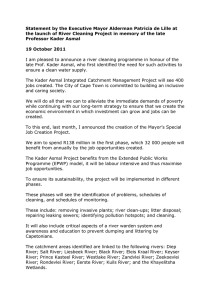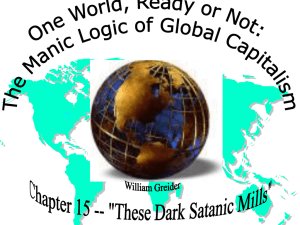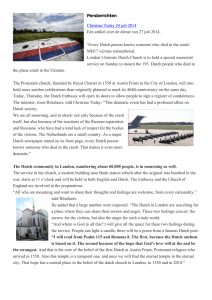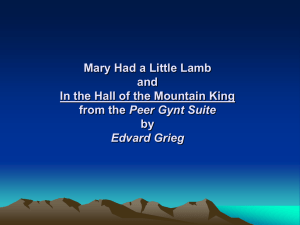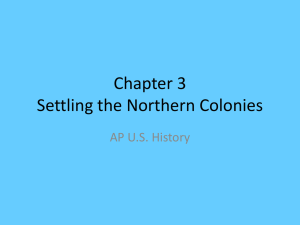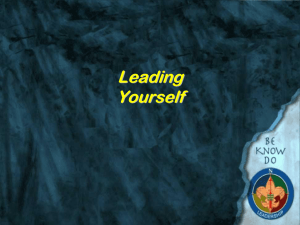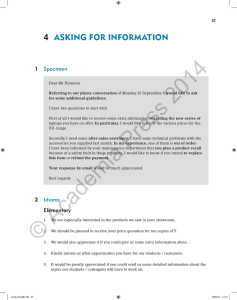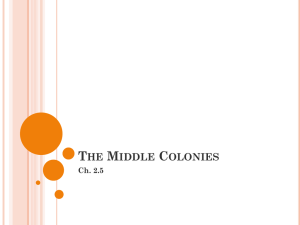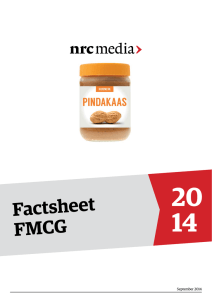Kader Abdolah Portraits and an Old Dream
advertisement
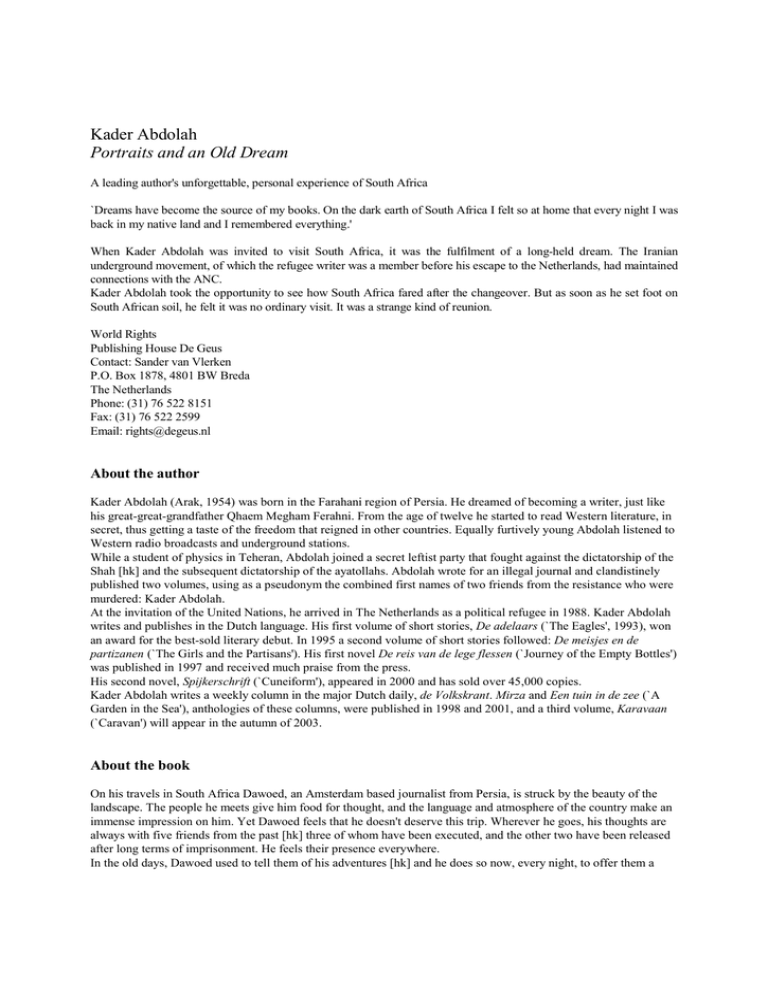
Kader Abdolah Portraits and an Old Dream A leading author's unforgettable, personal experience of South Africa `Dreams have become the source of my books. On the dark earth of South Africa I felt so at home that every night I was back in my native land and I remembered everything.' When Kader Abdolah was invited to visit South Africa, it was the fulfilment of a long-held dream. The Iranian underground movement, of which the refugee writer was a member before his escape to the Netherlands, had maintained connections with the ANC. Kader Abdolah took the opportunity to see how South Africa fared after the changeover. But as soon as he set foot on South African soil, he felt it was no ordinary visit. It was a strange kind of reunion. World Rights Publishing House De Geus Contact: Sander van Vlerken P.O. Box 1878, 4801 BW Breda The Netherlands Phone: (31) 76 522 8151 Fax: (31) 76 522 2599 Email: rights@degeus.nl About the author Kader Abdolah (Arak, 1954) was born in the Farahani region of Persia. He dreamed of becoming a writer, just like his great-great-grandfather Qhaem Megham Ferahni. From the age of twelve he started to read Western literature, in secret, thus getting a taste of the freedom that reigned in other countries. Equally furtively young Abdolah listened to Western radio broadcasts and underground stations. While a student of physics in Teheran, Abdolah joined a secret leftist party that fought against the dictatorship of the Shah [hk] and the subsequent dictatorship of the ayatollahs. Abdolah wrote for an illegal journal and clandistinely published two volumes, using as a pseudonym the combined first names of two friends from the resistance who were murdered: Kader Abdolah. At the invitation of the United Nations, he arrived in The Netherlands as a political refugee in 1988. Kader Abdolah writes and publishes in the Dutch language. His first volume of short stories, De adelaars (`The Eagles', 1993), won an award for the best-sold literary debut. In 1995 a second volume of short stories followed: De meisjes en de partizanen (`The Girls and the Partisans'). His first novel De reis van de lege flessen (`Journey of the Empty Bottles') was published in 1997 and received much praise from the press. His second novel, Spijkerschrift (`Cuneiform'), appeared in 2000 and has sold over 45,000 copies. Kader Abdolah writes a weekly column in the major Dutch daily, de Volkskrant. Mirza and Een tuin in de zee (`A Garden in the Sea'), anthologies of these columns, were published in 1998 and 2001, and a third volume, Karavaan (`Caravan') will appear in the autumn of 2003. About the book On his travels in South Africa Dawoed, an Amsterdam based journalist from Persia, is struck by the beauty of the landscape. The people he meets give him food for thought, and the language and atmosphere of the country make an immense impression on him. Yet Dawoed feels that he doesn't deserve this trip. Wherever he goes, his thoughts are always with five friends from the past [hk] three of whom have been executed, and the other two have been released after long terms of imprisonment. He feels their presence everywhere. In the old days, Dawoed used to tell them of his adventures [hk] and he does so now, every night, to offer them a share in the experience of his journey. Attar, one of the friends, attempts to commit the experiences to paper in his own way [hk] weaving together shreds of old Persian travel tales and accounts of people and events in South Africa. In doing so, he makes an old dream come true. `I made a tremendous amount of notes. Unconsciously, I travelled with five people. When I was back home, it dawned on me that South Africa wouldn't let me go. My notes compelled me to write [hk] it was an unwanted pregnancy, a disaster. Because in fact I wanted to write a different book. What I have experienced was richer, deeper than any travel book can convey. During a hike, five friends,comrades, insinuated themselves upon me. They wanted to be in the story, making me loose control of it. Through their eyes I saw South Africa again, went to places I had only dreamed of. I was like a chronicler. In the fifth manuscript version they simply took my pen from me, turning me into a character. These are five persons I feel guilty towards. While I managed to escape, they were arrested. Three of them were executed, two were imprisoned for a long time. They were younger than I. I destroyed their lives with the path I chose. I believe I am the cause of their fate.' [hk] Kader Abdolah Kader Abdolah, Portretten en een oude droom ISBN 90 445 0238 7 Hardback, 192 p. Rights sold to Klett-Cotta (Germany) Iperborea (Italy) Bibliography De adelaars (`The Eagles') (1993, stories) De meisjes en de partizanen (`The Girls and the Partisans') (1995, stories) De reis van de lege flessen (`Journey of the Empty Bottles') (1997, novel) Mirza (1998, columns) Spijkerschrift (`Cuneiform') (2000, novel) Een tuin in de zee (`A Garden in the Sea') (2001, columns) Portretten en een oude droom (`Portraits and an old dream', 2003) Karavaan (`Caravan') (2003, columns) Prizes and awards 1993 Gouden Ezelsoor Award for De adelaars 1995 Charlotte Köhler Stipend for De meisjes en de partizanen 1997 ASN-ADO-Media Prize for his Mirza column in de Volkskrant, a major Dutch daily 1998 Mundial Award for contributions in the field of international cooperation, peace and safety 2000 Royal Decoration for merits in the area of literature, international cooperation and peace 2001 E. du Perron Prize (oeuvre prize) The press about Portretten en een oude droom `One is hooked by its variety of composition: 21 chapters, each introduced by a little story with a moral and larded with African poems, Persian stories, and memories of the home country.' [hk] Trouw `The charm of this novel lies in its exteriority. Without exception, all that lives and breathes is embraced here. Or, as one of Abdolah's rebels has it: `life is a delicious experience.'[hk] NRC Handelsblad `A witness to the many sensory impressions that the South African landscape and people make on the writer.' [hk] De Telegraaf about Spijkerschrift `Abdolah pays homage to Slauerhoff and Bloem, to Hafez, Taher and Khayyam, to Max Havelaar and "De Rozentuin" and the Koran.' [hk] NRC Handelsblad `A most convincing book by an author who has acquired a unique position in Dutch literature.' [hk] Trouw `With Spijkerschrift Abdolah confirms that literature is no longer the domain of Dutchmen born and raised in the Netherlands. Critical, independent, inspired. An asset!' [hk] Elsevier `The importance of imagination can be sensed on every page. Imagination is not merely a fortuitous side-effect, it is a precondition for survival.' [hk] Vrij Nederland `Abdolah talks about Persia, not to tell an exotic tale, but to make its presence felt, to let it be loved even. He does not shun melodrama, but he does not shun humour either [hk] an aspect which is sometimes overlooked.' [hk] Standaard der Letteren about De reis van de lege flessen `What is most impressive about this melancholy and vulnerable book is that there is absolutely no room for rancour or cynicism.' [hk] Standaard der Letteren `His language is apt and subtle, his observations evocative.' [hk] NRC Handelsblad `Each event in the Netherlands is given its counterpart from the reservoir of tales from Abdolah's old Persian box. Subtly welded together, they interact until an intricate tapestry of stories emerges.' [hk] De Groene Amsterdammer about De adelaars `Even if it could all be said differently, not a single word is lacking here.' [hk] de Volkskrant `These stories grab hold of you and they won't let go.' [hk] Het Parool about De meisjes en de partizanen `These stories are transparent and precise. The situations Abdolah sketches play in the reader's mind like a film. The characters are so close that the reader can almost touch them.' [hk] Elsevier `Abdolah confirms his talent in this second volume.' [hk] NRC Handelsblad about Een tuin in de zee `Abdolah is an eminent craftsman who knows exactly what he is doing and who will find the right words [hk] in any language.' [hk] Trouw `A literary passport of an author who for two hundred and fifty pages passionately demonstrates: I belong here too!' [hk] GPD `An accomplished columnist, he is sharp, witty, moving, self-willed and to the point.' [hk] Zwolse Courant `Authors like Abdolah bring a touch of exoticism to Dutch literature. Yes, there is a dike in the desert. The readers are the better for it.' [hk] Friesch Dagblad A fragment from the novel The first night, Dawoed spoke about his dream in the plane: `Open the door. I'm sick!' We were surprised that in his dream the first thing he did was go home. Why sick? And why home? We talked about it through the night. Dawoed had flown to the ends of Africa, to the Indian Ocean. How strange that he had seen the edge of the Indian Ocean as home. The plane landed, Dawoed continued to say the first night: The moment I set foot on the brown earth, I felt at home. I had my mountains again and those simple little houses were mine, too. Holland had disappeared. Amsterdam was far away. I lived there for twelve whole years and I thought I felt at home, but as soon as I felt the hot sun on my face I knew I'd been a stranger there all that time. Holland is not my home, I thought, somewhat guiltily. What colour is South Africa? Dark yellow, dark red, dark green, dark blue, dark dark. For the first time, I saw black people in their own land, how can I put it into words, in their own place, no, I mean in the right place, where their beautiful black colour came into its own. It was the first time that I saw so many black people behind the counter. It radiated power. A white woman came [hk] no, she wasn't white, and not black either [hk] a brown woman came towards me, she greeted me in Afrikaans and said something that I understood and yet didn't. A kind of Dutch in a strong dialect. When she saw that I hadn't understood she switched to English. She'd come to pick me up. `Where are we going?' I asked. `To Stellenbosch!' We travelled in a small van. I stuffed my raincoat, overcoat and scarf into my suitcase. I wouldn't need them for a while. We drove for miles past poor little huts where thousands of black South Africans lived. No electricity, no water, no school. Then the vineyards appeared. The harvest had just ended. The trees were thirsty; the grapes lay in the wine cellars. The cars drove on the left hand side of the road. A rusted yellow train thundered past, the great-grandfather of all Dutch trains. I only knew Stellenbosch from a bottle of red wine. The town centre was small, but busy. The cafés were crowded, full of young whites. They're students, said my escort, all they do is drink beer. From ten o'clock in the morning they're here at the bar. She drove into a narrow little street and stopped in front of a beautiful colonial villa: `We're here.' I put my suitcase on the bed. A stylish room. I could see a mountain through the window. As though it were framed. `Come!' the mountain called. I immediately changed into my sports gear. Moments later I was walking on the ground of Africa, on the bare earth. It gave me a strange feeling. It had been a long time since I'd climbed a mountain. That was in my home country. As I ran I saw only black people and small children playing on the ground. I heard a babbling river. When was the last time I'd heard a babbling river? I'd long forgotten the riverbeds. But now its big stones were coming back to me. The trees had taken on the colour of the earth, dark, no white branches, and no white leaves either. Their shadows were black. I walked as far as I could, until I could go no further. The road was closed off with three rows of barbed wire. I didn't want to go back and looked for a bridge to get to the other side, but the opposite bank of the river was overgrown with tall reeds. Reluctantly, I went all the way back to a football pitch where I'd seen a bridge. I heard sounds coming from the reeds. A little black boy appeared on the other side of the river with a big bunch of purple-brown grapes in his hand. He emerged from the reeds and stood looking at me with his mouth full. `Hello! Can you tell me how I can get to that mountain?' I asked, first in Dutch and then in English. He pointed indifferently at the river. `Through the water?' He shook his head and pointed at a couple of stones on the riverbed. Holland had changed my way of seeing. I used to cross wild rivers to the mountains without getting a drop of water on my boots. Now I was unable to see that the arrangement of stones formed a perfect bridge. I jumped clumsily from one stone to another until I reached the other side. `Where do I go from here?' I asked the boy. He walked ahead, leading me into the wilderness. `Thank you', I said to him and started running again. On the way it suddenly occurred to me that climbing this mountain unprepared was not a very sensible thing to do. It would be better to go to the mountain's foot, assess the route and wait until the next day before climbing to the top. The sun had dried everything. I didn't yet fit into the landscape mentally. I'd been in Holland until the day before, everything was green and the ground couldn't absorb the rainwater. Now I was running among dried-out vegetation and fallen trees. I reached the foot of the mountain. Its summit beckoned, but I didn't have the nerve, I was afraid that something would happen to me and no one would be able to help me. I used to go out in the cold alone, through snow, storms, wild mountains, but now, in clear sunlight, I didn't even dare to climb that little mountain. Wanting to go back, I started to climb. Translated by Anne Hoey
